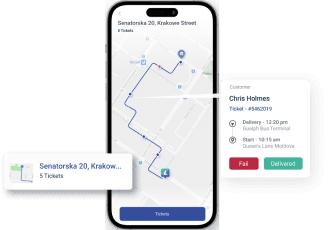Suppose you're on a road trip with friends, and your GPS device guides you to the best route, avoiding traffic jams. It sounds incredibly convenient, right? That's why so many people rely on GPS technology for everyday navigation and roadside assistance. Apps like Google Maps simplify navigation for everyone. Meanwhile, more advanced GPS systems provide detailed tracking and management features for businesses.
Now, think about fleet managers who oversee many vehicles. They use GPS to keep track of their trucks and cars. It helps them make sure drivers stick to the rules, work efficiently, and stay safe. This way, everything runs smoothly, and they end up saving a lot of money.
So, how does GPS tracking really work? What’s the story behind this amazing technology? Let’s break it down and explore the process together in this article.
What is a GPS tracking device?
A GPS tracking device is a small electronic tool designed to monitor the location of your vehicle. Unlike a GPS navigation system, which guides you to your destination, a GPS tracker provides continuous updates about your vehicle’s location. This data is sent to your computer or smartphone, allowing you to track your vehicle’s movements and ensure its safety at all times.
How Does GPS Tracking Work?
GPS tracking works thanks to a network of satellites circling Earth. These satellites send out signals, which GPS devices receive. The device figures out its location by measuring the time it takes for the signals to travel. This location data is then sent over cell networks or the internet to GPS tracking software.
After that, the software processes this information and displays it in a simple, user-friendly way, like on maps or dashboards. For fleet managers, this means they can easily see where their vehicles are, look at past trips, and understand how their drivers are performing, making fleet management much smoother.
What Is GPS Tracking Used For?
Many businesses rely on GPS tracking software. These companies use GPS tracking software for multiple benefits. It monitors vehicle locations in real-time and helps manage routes efficiently.
Vehicle Tracking
GPS tracking is transformative for managing vehicles, whether personal or commercial. It enables real-time location monitoring, ensuring timely deliveries and enhancing vehicle security. This technology offers peace of mind for both individual car owners and fleet managers by simplifying the tracking of vehicle movements.
Fleet Tracking
In industries such as transportation, waste management, and public services, GPS technology helps manage multiple vehicles simultaneously. Fleet managers benefit from real-time location tracking, which simplifies dispatch and coordination. Businesses also gain insights into vehicle performance and driver behaviour, helping them make informed decisions, reduce costs, and improve service quality.
Heavy Machinery
Construction and mining industries rely heavily on GPS tracking for monitoring heavy machinery. It ensures that machinery follows planned paths and work schedules accurately. Real-time updates on location and performance reduce downtime and enhance project efficiency. Additionally, it helps monitor fuel consumption and machinery health, contributing to effective resource management and budget adherence.
Agricultural Use
Farmers use GPS tracking to manage agricultural equipment and optimize field operations. It aids in precise planting, monitoring crop growth, and applying fertilizers or pesticides effectively. This technology supports precision farming, improving productivity by providing accurate data on field conditions and equipment usage, leading to better resource management and higher crop yields.
Route Planning
GPS tracking revolutionizes route planning by offering real-time information on traffic conditions, weather, and other factors. It helps plan the best routes, ensuring timely and efficient deliveries while reducing delays. Businesses can optimize multi-stop routes and adjust plans quickly, enhancing logistics and service efficiency.
Why Should You Use GPS for Your Fleet?
GPS software offers a range of benefits for fleet management:
- It improves route efficiency by avoiding traffic and optimizing travel times.
- Reduces fuel costs through better route planning and fewer unnecessary miles.
- monitors driver behaviour to minimize accident risks.
- Enhances customer service with accurate delivery times.
- GPS Software cut down maintenance costs by tracking vehicle performance and scheduling timely repairs.
- It boosts productivity by keeping track of vehicle locations and ensuring timely deliveries.
- GPS devices increase fleet security with real-time alerts if vehicles vary from approved routes.
- It also supports better decision-making through detailed reports and analytics.
- It simplifies compliance with regulations by integrating GPS data with electronic logging devices.
- It reduces operational costs with insights into vehicle usage and driver performance.
How to Choose the Right GPS Software?
Choosing the right GPS tracking software involves evaluating a few key qualities. Look for software that offers real-time tracking and detailed, user-friendly reports. This ensures you have accurate data for making informed decisions. Additionally, consider a user-friendly interface and seamless integration capabilities. The software should easily connect with your existing systems and be simple for your team to use. A reliable GPS tracking solution enhances fleet management and operational efficiency.
Feature:
- It has a user-friendly interface, so your team won’t struggle with complicated menus or settings.
- It integrates smoothly with your existing systems, so you don’t have to overhaul everything.
- You can look at past data to see where your vehicles have been and how they performed.
- It comes with geofencing, which lets you set virtual boundaries and get alerts when vehicles cross them.
- You’ll get real-time tracking, so you always know where your vehicles are right now.
- The software creates detailed reports that are super easy to read, helping you make smart decisions.
- It tracks driver behaviour like speed and braking, giving you insights to boost safety and performance.
Which Is the Best GPS Tracking Software?
Lumyri’s GPS software stands out with its advanced features and user-friendly design. It offers real-time location tracking, detailed reporting, and easy integration with other management systems. Its intuitive interface ensures you can quickly access and utilize your GPS data.
Additionally, Lumyri provides robust security features to protect your data and keep your fleet secure. With its comprehensive tools and design, Lumyri is an excellent choice for businesses aiming to improve fleet management and operational efficiency.
Final Words
GPS tracking technology has become essential for modern fleet management and various other applications. It offers valuable insights, boosts efficiency, and enhances security. Whether managing a single vehicle or an entire fleet, investing in the right GPS tracking software can significantly benefit your operations. GPS software like Lumyri equips you with the tools needed to stay ahead in a competitive landscape.

Aiden mitchell
As a GPS Tech geek, I find Lumyri's transformative impact on GPS technology on businesses and their customers. Real-time tracking information empowers businesses to provide accurate delivery estimates, allowing customers to plan their schedules with precision.



